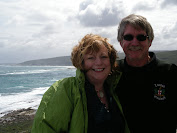Kruger National Park
Above:- I love it when they pose for me (and I humbly apologise to my faithful Canon Power shot for even admiring the new version in the duty free shop).
So this was the highlight of the trip and the reason we went back to South Africa – to go on Safari and see the animals.
And it was a huge day, and to my relief Kruger Park is much better than the Dubbo Zoo! For a start it is huge ~ ‘some say’ the size of Wales. So we only saw a very small piece of it.
We were up at 03:30 for the full day tour, as we left early so no breakfast before we started.
We went in via the Paul Kruger Gate, which is the closest to Hazyview.
And The early start was worth it, as we saw more animals before breakfast than we did for the rest of the day.
At least it wasn’t too hot, cool in the morning then up to about 26ish in the afternoon.
~~~~~~~~~~~
Only just through the gate and we met this fellow crossing the road!
Oh Hello – crossing here! Well maybe not….
okay, okay – going now!
…………Watch out….Here I go!…….
…and we also met a female Kudu,
and a Crowned Hornbill.
Pumba..!
The great recyclers, a White Headed Vulture.
Cue the ‘Benny Hill’ theme tune – here are a pack of Wild Dogs, being chased by a Baboon, which in turn is being chased by a pack of tourists.
Wild dogs are the most efficient hunters with a kill rate higher than all African predators.
Another elephant….
Velvet monkeys,
Below ~ Another finalist for Photo of the Day - The Black Rhino. Graham spotted this looking like a rock in a bush, apparently to see a black Rhino is very rare.
Black rhinos became extinct in the Kruger National Park by 1945. Between 1971 and 1989 a total of 81 black rhinos were re-introduced, with a further 6 animals added in 1998. Presently the black rhino population is estimated to be about 300. - WWF
and then some very distant and amorous Lions – this is Grahams photo as mine was just a furry blur.
and Impalas, the fast food of the African world, this is a newborn. Apparently Impalas can stall the birth of their babies until after a good rainfall.
A Zebra crossing – Boom, Boom. Aren’t they beautiful, how could you make them into a rug, (and we’ve seen lots of Zebra hides for sale in gift shops).
And all that was all before breakfast! Phew, I’ve already used up one battery in my camera.
After a bacon and egg sandwich we met a Waterbuck,
and more Elephants,
then a stop to admire the beauty and vastness of the park…
Next, a family of Giraffes,
and a Wilder Beast.
Don’t think these are all zoom lens shots – this is how close some of the animals come.
Then finally a Buffalo doing what Buffalos do best,
and a White Rhino.
Do You Know the Difference Between Black and White Rhinos?
No Its not the colour.
The term white rhino is actually a mistranslation; the Dutch settlers in South Africa initially called them “Weid mond rhino”, meaning “Wide-mouth rhino.” White and black rhinos are similar in color. The most notable difference between white and black rhinos are their mouths. Because black rhinos are grazers, they have smaller, hook-shaped lips that allow them to grasp prickly shrubs and trees.
Black and white rhinos also have different body shapes: white rhinos have bigger heads and longer necks than the blacks; the white rhinos are also slightly taller with longer tails. The white rhino is built slightly differently, with their hips lower than their shoulders, resulting in a sloped shape to their back in contrast to the blacks that have dipped backs. http://www.ecology.com/2012/08/22/difference-black-white-rhinos/
And that was it, back to our resort late afternoon and very tired.
We didn’t see ALL the big 5.
Which are the Elephant, Lion, Rhino, Buffalo and Leopard.
We missed the Leopard! But we did see both the Rhinos.
We may have a second chance in a couple of days when we have a evening Safari booked.






































+019.jpg)

No comments:
Post a Comment